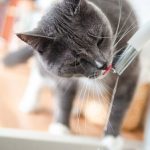1. Why Ear Cleaning Is Essential for Pets
Keeping your pet’s ears clean is a crucial part of their overall health and well-being. Many pet owners may not realize that neglecting ear hygiene can lead to infections, discomfort, and even hearing loss over time. Regular ear cleaning helps prevent these issues and ensures your furry friend stays happy and healthy.
Preventing Infections
Pets, especially those with floppy ears or excessive hair in the ear canal, are more prone to ear infections. Dirt, wax buildup, and moisture create the perfect environment for bacteria and yeast to thrive. By using proper ear cleaning products, you can remove debris and reduce the risk of painful infections.
Avoiding Discomfort
When pets develop dirty or infected ears, they often experience itching, redness, and irritation. This discomfort can cause them to scratch excessively or shake their heads frequently. If left untreated, this may lead to wounds or further complications. Routine ear cleaning helps prevent these problems before they start.
Protecting Their Hearing
Chronic ear infections or excessive wax buildup can impact your pet’s ability to hear properly. Over time, this can lead to partial or total hearing loss. Keeping their ears clean ensures that sound waves can travel freely into the ear canal without obstruction.
Signs Your Pet Needs an Ear Cleaning
| Signs | Description |
|---|---|
| Frequent Head Shaking | Your pet shakes their head repeatedly as if trying to get something out of their ear. |
| Pawing at Ears | Your pet scratches or rubs their ears more often than usual. |
| Unpleasant Odor | A strong smell coming from the ears could indicate infection or excessive wax buildup. |
| Redness or Swelling | The inside of the ears appears inflamed, which could be a sign of irritation or infection. |
| Discharge or Excessive Wax | You notice dark-colored wax or unusual discharge in the ear canal. |
The Importance of Using Proper Ear Cleaning Products
Not all cleaning methods are safe for pets. Using cotton swabs or harsh chemicals can do more harm than good. Instead, veterinarians recommend specialized ear cleaning solutions designed for pets. These products help break down wax, remove debris, and maintain a balanced ear environment without causing irritation.
2. Common Ear Problems in Pets
Just like humans, pets can experience various ear issues that may cause discomfort and lead to serious health problems if left untreated. Regular ear cleaning is essential to prevent these conditions and keep your furry friend happy and healthy.
Ear Infections
Ear infections are one of the most common issues in pets, especially in dogs with floppy ears. These infections are often caused by bacteria or yeast buildup due to moisture, dirt, or wax accumulation. If your pet frequently scratches their ears, shakes their head, or has a bad odor coming from their ears, they might have an infection.
Wax Buildup
While some earwax is normal, excessive buildup can block airflow and trap moisture, creating an environment for bacteria to grow. This can lead to irritation and discomfort for your pet. Regular ear cleaning helps remove excess wax and keeps the ears healthy.
Ear Mites
Ear mites are tiny parasites that infest the ear canal and cause severe itching and irritation. They are more common in cats but can also affect dogs. If you notice dark debris resembling coffee grounds in your pet’s ears along with constant scratching, they may have ear mites.
How Ear Issues Affect Your Pet’s Health
If not treated properly, these common ear problems can lead to more serious health complications such as chronic infections, hearing loss, or even balance issues. Here’s a quick overview of how different ear issues can impact your pet:
| Ear Problem | Symptoms | Potential Complications |
|---|---|---|
| Ear Infections | Redness, swelling, bad odor, head shaking | Pain, chronic infections, hearing loss |
| Wax Buildup | Muffled hearing, discomfort, bad smell | Bacterial growth, infections |
| Ear Mites | Coffee-ground debris, intense itching, head shaking | Irritation, secondary infections |
The good news is that many of these problems can be prevented with routine ear cleaning using the right products. Keeping your pets ears clean reduces the risk of infections and other complications while ensuring they stay comfortable and happy.
![]()
3. Choosing the Right Ear Cleaning Products
Selecting the best ear cleaning product for your pet is essential for their health and comfort. Not all products are created equal, and using the wrong one can lead to irritation or infections. Here’s a guide to help you choose a safe and effective solution tailored to your pet’s needs.
Ingredients to Look For
The right ingredients can help clean your pet’s ears while keeping them healthy. Look for these beneficial components:
| Ingredient | Benefits |
|---|---|
| Aloe Vera | Soothes irritation and promotes healing |
| Salicylic Acid | Helps remove excess wax and debris |
| Lactic Acid | Maintains a balanced pH level in the ear |
| Witch Hazel | Naturally cleans without excessive drying |
| Coconut Oil | Provides natural antibacterial properties |
Ingredients to Avoid
Certain ingredients can be harmful or overly harsh on your pet’s sensitive ears. Avoid products that contain:
- Alcohol: Can cause dryness and irritation.
- Hydrogen Peroxide: May damage delicate ear tissues with frequent use.
- Artificial Fragrances: Can lead to allergic reactions and discomfort.
- Harsh Chemicals (e.g., Chlorhexidine in high concentrations): Can be too strong for routine use.
Selecting the Right Product for Your Pet’s Needs
Your choice of ear cleaner should depend on your pet’s specific needs. Consider these factors:
If Your Pet Has Sensitive Ears
Avoid strong chemicals and opt for gentle, natural ingredients like aloe vera and coconut oil.
If Your Pet Is Prone to Infections
Select an ear cleaner with antimicrobial properties such as witch hazel or lactic acid.
If Your Pet Has Excess Wax Buildup
A formula containing salicylic acid can help break down wax effectively without irritating the skin.
Consulting Your Veterinarian
If you’re unsure which product is best for your pet, consult your veterinarian. They can recommend a solution based on your pet’s breed, lifestyle, and any existing ear conditions.
4. How to Properly Clean Your Pet’s Ears
Keeping your pet’s ears clean is essential for their overall health. Regular ear cleaning helps prevent infections, removes dirt and wax buildup, and ensures your furry friend stays comfortable. Follow these step-by-step instructions to safely clean your pet’s ears at home while avoiding injury or irritation.
Step-by-Step Guide to Cleaning Your Pet’s Ears
Step 1: Gather Your Supplies
Before starting, make sure you have everything you need:
| Essential Supplies | Purpose |
|---|---|
| Pet-safe ear cleaning solution | Dissolves wax and debris safely |
| Cotton balls or gauze | Helps wipe away dirt and excess liquid |
| Treats | Rewards your pet for cooperation |
| A towel | Keeps your pet secure and minimizes mess |
Step 2: Create a Calm Environment
Find a quiet space where your pet feels relaxed. Gently hold them in place, using a towel if necessary to keep them steady.
Step 3: Apply the Ear Cleaning Solution
Carefully lift your pet’s ear flap and squeeze a few drops of the ear cleaning solution into the ear canal. Avoid inserting anything deep inside.
Step 4: Massage the Base of the Ear
Gently massage the base of the ear for about 20–30 seconds to help break up debris and wax. You may hear a squishing sound—this is normal.
Step 5: Let Your Pet Shake Their Head
Allow your pet to shake their head naturally. This helps remove loosened debris from the ear canal.
Step 6: Wipe Away Excess Dirt and Solution
Use a cotton ball or gauze to gently wipe away any visible dirt or leftover solution from the outer part of the ear. Do not use cotton swabs inside the ear canal.
Step 7: Reward Your Pet
Give your pet a treat and some praise to create a positive association with ear cleaning.
How Often Should You Clean Your Pet’s Ears?
| Pet Type | Recommended Cleaning Frequency |
|---|---|
| Dogs with floppy ears (e.g., Cocker Spaniels) | Once a week |
| Dogs with upright ears (e.g., German Shepherds) | Every 2–3 weeks |
| Cats | Once a month or as needed |
| Pets prone to infections | As recommended by your vet |
Avoid These Common Mistakes
- Avoid using alcohol or hydrogen peroxide, as they can irritate the ears.
- Never insert cotton swabs deep into the ear canal—they can push debris further in.
- If you notice redness, swelling, or an unusual odor, consult your veterinarian before proceeding with home cleaning.
- Do not over-clean; excessive cleaning can lead to irritation and infections.
By following these steps, you can ensure that your pets ears remain healthy and free from infections. Make ear cleaning a regular part of your pet care routine for their comfort and well-being.
5. How Often Should You Clean Your Pet’s Ears?
Keeping your pet’s ears clean is an essential part of their overall health, but how often should you do it? The answer depends on several factors, including your pet’s breed, lifestyle, and medical history. Some pets need frequent ear cleanings, while others require minimal maintenance.
Breed-Specific Ear Cleaning Needs
Certain breeds are more prone to ear issues due to the shape and structure of their ears. Breeds with floppy ears or a lot of hair inside the ear canal tend to trap moisture and debris, making them more susceptible to infections.
| Pet Breed | Recommended Cleaning Frequency |
|---|---|
| Dogs with floppy ears (e.g., Cocker Spaniels, Basset Hounds) | Once a week |
| Dogs with upright ears (e.g., German Shepherds, Huskies) | Every 2-4 weeks |
| Cats (most breeds) | Every 3-4 weeks or as needed |
Lifestyle Considerations
Your pet’s daily activities also impact how often their ears should be cleaned. Pets that swim frequently or spend a lot of time outdoors may need more regular ear care to prevent infections.
| Lifestyle Factors | Recommended Cleaning Frequency |
|---|---|
| Pets that swim often | After every swim session |
| Pets that play outside frequently (grass, dirt, etc.) | Once a week |
| Pets that stay indoors most of the time | Every 2-4 weeks |
The Role of Medical History in Ear Cleaning Routine
If your pet has a history of ear infections or allergies, they may require more frequent cleanings to prevent flare-ups. Always follow your veterinarian’s recommendations based on your pet’s specific needs.
| Medical Condition | Recommended Cleaning Frequency |
|---|---|
| Pets prone to ear infections | 1-2 times per week (as advised by a vet) |
| Pets with allergies affecting the ears | Avoid irritants and clean weekly if necessary |
| Pets with no history of ear problems | A routine cleaning every few weeks is sufficient |
The Importance of Consistency in Ear Cleaning Routines
No matter your pet’s breed, lifestyle, or medical background, establishing a consistent ear-cleaning schedule is crucial. Regular checks help you spot early signs of infection or irritation before they become serious problems. If you ever notice redness, excessive wax buildup, or a bad odor coming from your pet’s ears, consult your vet for guidance.
A Few Quick Tips for Effective Ear Cleaning:
- Avoid using cotton swabs: These can push debris deeper into the ear canal.
- Select a vet-approved cleaner: Not all cleaning solutions are safe for pets.
- Create a positive experience: Reward your pet with treats after each cleaning session.
- If unsure, ask your vet: They can provide personalized recommendations based on your pets needs.
Caring for your pet’s ears doesn’t have to be complicated! By tailoring their cleaning routine based on their breed, lifestyle, and health history, you can keep their ears healthy and free from infections.


